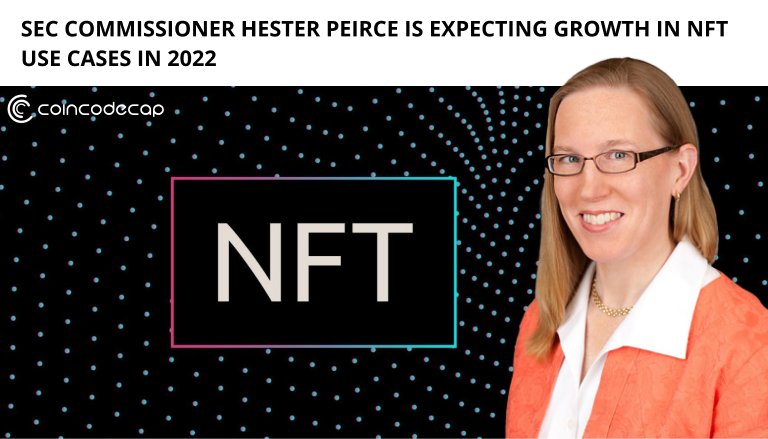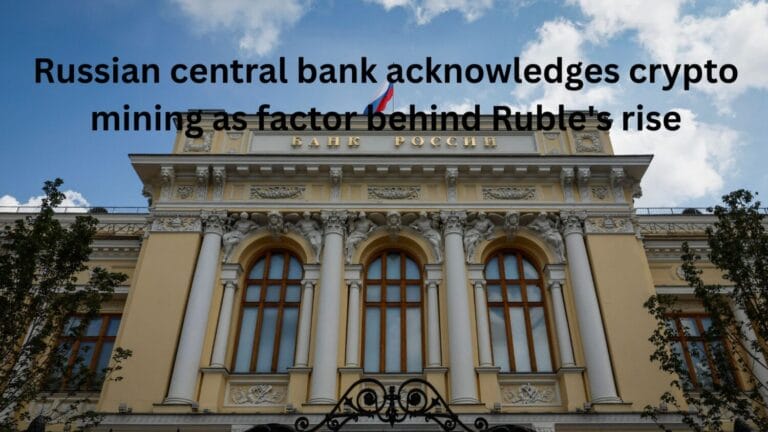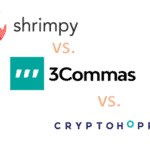Key takeaways
- In 2022, SEC commissioner Hester Peirce predicts a growth in the financialization of non-fungible tokens (NFTs), implying that holders must be mindful of how their actions may breach securities regulations.
- Peirce also claimed that the grounds used to defend the denials have been outdated for some time and that she doesn’t understand why there isn’t a bitcoin ETF available for trading in the United States right now.

According to Peirce, as the area expands, holders will need to be aware of the potential for their activities to violate securities laws.
Peirce gave her 2022 outlook in an interview with CoinDesk’s First Mover on Thursday. As people figure out how to extract more value from the tokens, Peirce predicts that further use cases for NFTs will emerge. Peirce advised that as these use cases grow ownership and governance rights, holders should consider how they might interact with securities regulations.
“I think as people have learned, our definition of security is quite broad, and so people need to be thinking about potential places where NFTs might run into securities regulatory regime,”
Hester Peirce
According to Peirce, the placement of the intersections has yet to be decided. She has, however, already written about how fractionalization of NFTs could violate the SEC’s mandate.
SEC Commissioner Hester Peirce Says Washington Doesn’t Need a New Crypto Regulator:
Hester Peirce also expressed her confusion as to why a bitcoin spot ETF has yet to be approved, claiming that the reasons for the denial are antiquated.
According to U.S. Securities and Exchange Commission Commissioner Hester Peirce on CoinDesk TV’s First Mover Thursday, forming a single regulator to regulate crypto would not be a cure for the industry’s regulatory difficulties.
“I certainly understand the impulse to call for one regulator. I have a couple problems with it,” Peirce said. “Typically in Washington, when you build another regulator, all you get is all the existing regulators plus one.”
As bigger firms began to hop on the Bitcoin bandwagon last year, regulation was at the forefront of Bitcoin and cryptocurrency concerns in 2021. Larger investors typically desire more regulatory certainty since large investments might come with large risks in an uncertain climate.
Coinbase and U.S. Senator Cynthia Lummis are among those calling for a new, single U.S. regulator to oversee crypto (R-Wyo.).
This year, one of the most important aspects of Bitcoin regulation was exchange-traded funds (ETFs). The SEC approved the first bitcoin-linked ETF in the United States in October, the ProShares Bitcoin Strategy ETF, which is based on derivatives. Despite the early enthusiasm, which led to the offering becoming the fastest to achieve $1 billion in assets, growing expenses and active management difficulties drove investors away from the vehicle, which invests in bitcoin futures contracts rather than the currency directly, as the ProShares ETF does. Many people were looking for a place to trade in US marketplaces as a result of the phenomenon.
Many cryptocurrency enthusiasts refer to Peirce as “Crypto Mom” because of her longtime support for the industry. Peirce has been outspoken about the SEC’s failure to provide a working regulatory framework for the crypto industry, as well as its tendency to regulate by enforcement.
Despite the United States’ desire for a spot bitcoin ETF, the truth is that such an offering isn’t technically necessary, and most investors should avoid it. Retail investors can gain a greater understanding of the bitcoin price by purchasing and holding BTC personally, as well as benefiting from the peer-to-peer network’s resistance to manipulation and censorship, something they wouldn’t get from a bitcoin ETF.
Despite the fact that SEC Chairman Gary Gensler has said several times why such plans were rejected, the exact reasons remain unknown. Concerns about the SEC’s ability to safeguard investors and prevent fraud and manipulation have caused the watchdog to decline every proposal that has come across its desk thus far.
Peirce said she doesn’t understand why there isn’t a bitcoin ETF available for trading in the United States now, claiming that the arguments used to support the denials have been outdated for some time.









